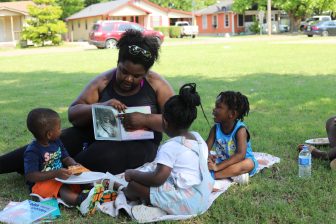
State Sen. Brice Wiggins used his state campaign funds to fund a Super PAC that is aiding his campaign for the 4th Congressional District seat — which appears to be prohibited by federal election law.
The campaign for incumbent Congressman Steven Palazzo confirmed on Tuesday that a complaint regarding Wiggins’ campaign spending was filed to the Federal Election Commission by a constituent from the district.
The Fight for Mississippi PAC, which has aired television commercials in south Mississippi supporting Wiggins’ candidacy for the U.S. House seat, received $165,000 in funding from Wiggins’ state campaign fund in March, according to Federal Election Commission records. U.S. law generally prohibits funds raised for a state campaign from being used in federal elections.
In addition, federal laws and rules also limit the influence that a candidate can have with political action committees, which are supposed to act independently of the candidate. Past FEC opinions have cited $50,000 given from a candidate to a super PAC as perhaps violating federal guidelines, though the FEC has said each case must be judged independently to determine if the amount of the contribution from the candidate to the super PAC is improper.
The $165,000 contribution from Wiggins’ state Senate campaign fund in March is the only funding the Fight for Mississippi PAC has received. The Super PAC has run pro-Wiggins TV commercials in south Mississippi critical of Palazzo, specifically referencing that Palazzo is currently being investigated by the U.S. House Ethics Committee over allegations he misspent campaign funds.
When asked to comment on his own alleged campaign misspending this week, Wiggins directed questions to the Super PAC. Elizabeth Curtis of Alexandria, Va., who is listed as the treasurer of the Super PAC, did not respond to questions from Mississippi Today.
This is Wiggins’ second alleged federal campaign spending violation this calendar year. Mississippi Today reported in February that Wiggins improperly funneled state campaign funds directly to his individual federal campaign fund.
When asked about the issue in February, Wiggins said in a written response, “We found on Dec. 3 that congressional ads for a few weeks were incorrectly charged to a credit card of the (state) Committee to Elect Brice Wiggins.”
“We corrected this Dec. 3, and the $1,170.07 cost is being reimbursed to the state campaign along with a $10 reimbursement for a Facebook post I made myself on Nov. 2,” Wiggins wrote. “An amendment to the FEC filing is being made.”
Wiggins also wrote: “My intent is to always be transparent.”
Wiggins is one of six Republican candidates challenging Palazzo in the June 7 GOP primary for the 4th Congressional District seat, which represents a large portion of south Mississippi, including the three Gulf Coast counties.
Campaign finances have for months been at the center of the 4th District race. Palazzo, the 10-year incumbent of the seat, is under investigation by the House Ethics Committee over allegations of campaign fund misspending and other issues.
A congressional watchdog agency’s report, which prompted a House Ethics investigation, claims Palazzo misspent campaign and congressional funds, used his office to help his brother and used staff for personal errands and services.
Allegations have previously been reported that Palazzo used campaign funds to pay himself and his erstwhile wife nearly $200,000 through companies they own — including thousands to cover the mortgage, maintenance and upgrades to a riverfront home Palazzo owned and wanted to sell. A Mississippi Today report also questioned thousands in Palazzo campaign spending on swanky restaurants, sporting events, resort hotels, golfing and gifts.
In a written response to this week’s allegations about Wiggins’ campaign misspending, Palazzo campaign manager Justin Brasell said: “Being a trial attorney, it looks like Sen. Wiggins would take time to know the law before transferring $165,000 to a super PAC. Thankfully, in spite of Wiggins’ illegal activities, Congressman Palazzo will win re-election and will continue supporting our state’s key role in homeland and national defense as a senior member of the Appropriations Committee.”
The complaint filed against Wiggins this week said that previous FEC rulings have established that it is illegal for an entity that is acting on behalf of a federal candidate to receive funds from prohibited sources, such as a state campaign account.
“Wiggins has violated the (federal) Act by directing and transferring soft money from his state campaign committee to Fighting for Mississippi PAC, a super PAC that clearly intends to support Wiggins’ congressional campaign,” read the complaint, shared with Mississippi Today.
The post Wiggins again misused state campaign funds for congressional race, complaint alleges appeared first on Mississippi Today.



















